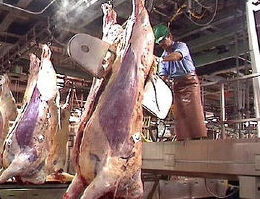hankyoreh
Links to other country sites 다른 나라 사이트 링크
Genetically-modified crops and mad cows: perils of globalization?

The globalization of the food industry has brought about a disastrous spread of disease, and nations are accordingly waging a fierce "food war" with one another. This stands in contrast with the movement to open up the world's agricultural market, which has accelerated with the World Trade Organization (WTO) Doha Development Agenda (DDA).
The drive to maintain a "safe dinner table" via "food sovereignty" has increasingly gotten tougher. The first shipment of U.S. beef since South Korea resumed imports arrived on November 24, but Seoul returned the beef because bone fragments were found in it. These fragments could spread mad cow disease, which has become a main cause of trade conflict over the last decade. The European Union (EU) in May resumed imports of England-produced beef after a breakout there, but only on a limited basis and after a 10-year ban. But controversy still remains over the decision.
In Japan, which resumed imports of U.S. beef in December last year after a two-year ban, fears linger, and Japan has repeatedly changed its policies on the problem in order to address public concerns.
Since the British government acknowledged that humans could be infected with a form of mad cow disease in 1996, about 180 persons have died from that variant, Creutzfeldt-Jakob disease (CJD). Many scholars warn that if CJD is spread through tainted beef, it could kill hundreds of thousands in a single nation,
In addition, the controversy over genetically modified organisms (GMO) is ongoing. GMOs have rapidly boomed in some nations, including the United States due to low production cost, but the EU raised a strong objection to it. The EU has banned imports of GMOs since 1998, citing the possible harm to humans and the environment. In 2004, the EU partly eased the regulation, but there were other obstacles, such as individual nations trying to ban imports of food containing GMOs, strict customs clearance procedures, and consumers' cold response to GMO-derived products.
The WTO dispute settlement panel, which investigated a trade dispute raised by the U.S., Canada, and Argentina in 2003, supported the three nations on November 21, saying that a GMO import ban by other nations has been excessively extended without determining if GMOs are actually dangerous.
Friction between nations surrounding food imports has increased, owing to not only safety concerns but also the question of using the issue for political purposes.
For example, Russia has engaged in a politicized confrontation with pro-U.S. Georgia, banning imports of wine and water from Georgia in the spring.
In addition, Russia said on November 22 that it would review its import of meat produced in Europe from next year. In response, the EU complained that Russia's announced measure was designed to serve a political purpose; namely, that Russia was seeking concessions on other issues by threatening its import status regarding EU food products.
Experts predict that with ongoing globalization and trade expansion of farm and marine products, the controversy will only continue.
Please direct questions or comments to [englishhani@hani.co.kr]
Editorial・opinion
![[Column] Park Geun-hye déjà vu in Yoon Suk-yeol [Column] Park Geun-hye déjà vu in Yoon Suk-yeol](https://flexible.img.hani.co.kr/flexible/normal/500/300/imgdb/original/2024/0424/651713945113788.jpg) [Column] Park Geun-hye déjà vu in Yoon Suk-yeol
[Column] Park Geun-hye déjà vu in Yoon Suk-yeol![[Editorial] New weight of N. Korea’s nuclear threats makes dialogue all the more urgent [Editorial] New weight of N. Korea’s nuclear threats makes dialogue all the more urgent](https://flexible.img.hani.co.kr/flexible/normal/500/300/imgdb/original/2024/0424/7317139454662664.jpg) [Editorial] New weight of N. Korea’s nuclear threats makes dialogue all the more urgent
[Editorial] New weight of N. Korea’s nuclear threats makes dialogue all the more urgent- [Guest essay] The real reason Korea’s new right wants to dub Rhee a founding father
- [Column] ‘Choson’: Is it time we start referring to N. Korea in its own terms?
- [Editorial] Japan’s rewriting of history with Korea has gone too far
- [Column] The president’s questionable capacity for dialogue
- [Column] Are chaebol firms just pizza pies for families to divvy up as they please?
- [Column] Has Korea, too, crossed the Rubicon on China?
- [Correspondent’s column] In Japan’s alliance with US, echoes of its past alliances with UK
- [Editorial] Does Yoon think the Korean public is wrong?
Most viewed articles
- 1[Column] Park Geun-hye déjà vu in Yoon Suk-yeol
- 2Thursday to mark start of resignations by senior doctors amid standoff with government
- 3Kim Jong-un expressed ‘satisfaction’ with nuclear counterstrike drill directed at South
- 4[Column] ‘Choson’: Is it time we start referring to N. Korea in its own terms?
- 5N. Korean hackers breached 10 defense contractors in South for months, police say
- 6Will NewJeans end up collateral damage in internal feud at K-pop juggernaut Hybe?
- 7Why Korea shouldn’t welcome Japan’s newly beefed up defense cooperation with US
- 8[Editorial] New weight of N. Korea’s nuclear threats makes dialogue all the more urgent
- 9[Guest essay] The real reason Korea’s new right wants to dub Rhee a founding father
- 10[Column] Yoon’s first 100 days should open our eyes to pitfalls of presidential system